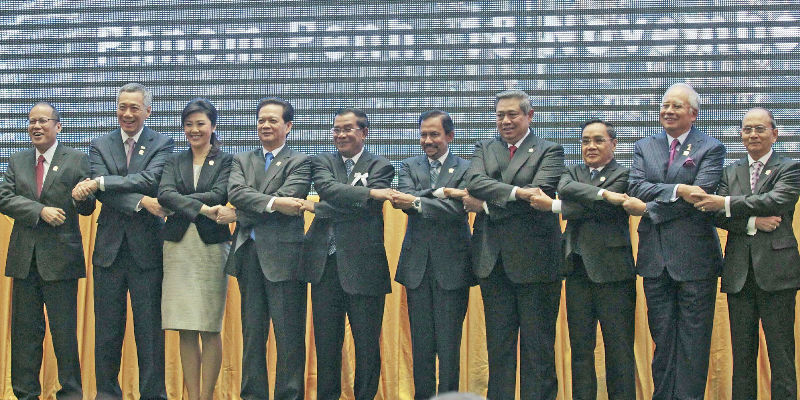Asean solidarity seen in China row

ASEAN 10 President Benigno S. Aquino (left) links arms with fellow regional leaders, Singapore Prime Minister Lee Hsien Loong, Thailand Prime Minister Yingluck Shinawatra, Vietnam Prime Minister Nguyen Tan Dung, Cambodia Prime Minister Hun Sen, Brunei Sultan Hassanal Bolkiah, Indonesia President Susilo Bambang Yudhoyono, Laos Prime Minister Thongsing Thammavong, Malaysia Prime Minister Najib Razak and Burma (Myanmar) President Thein Sein, during the opening ceremony of the 21st Asean Summit and related summits at the Peace Palace in Phnom Penh. The summit’s theme is “Asean: One Community, One Destiny.” MALACAÑANG PHOTO
PHNOM PENH—Leaders of the Association of Southeast Asian Nations (Asean) on Sunday projected a “palpable sense of solidarity” here as they sought to mend cracks in relations caused by territorial rows with their giant neighbor to the north, China.
A flu-stricken President Aquino joined nine other Asean leaders at the opening of the 21st Asean Summit and related summits, during which he took a firm but gentler tone in pushing for a single Asean voice in the disputes with China over territories in the West Philippine Sea (South China Sea).
In his address to fellow leaders of the 10-nation bloc, Mr. Aquino said Asean was now one of the “few bright spots in a world beset with uncertainty,” and that it must continue to engage in constructive dialogue, strengthen its resolve, and reaffirm its respect for international law, in particular, the United Nations Convention on the Law of the Sea (Unclos).
Asean groups Brunei, Burma (Myanmar), Cambodia, Indonesia, Laos, Malaysia, the Philippines, Singapore, Thailand and Vietnam.
The summit is being held following months of acrimony within Asean over how to handle disputes with China over conflicting claims to the strategically vital West Philippine Sea.
Article continues after this advertisementThe maritime tensions are expected to be high on the agenda, as well as at two days of expanded talks starting Monday that will include US President Barack Obama and Chinese Premier Wen Jiabao.
Article continues after this advertisement“More than at any other time in the history of our organization, unity has become the bedrock of our shared progress,” Mr. Aquino said.
“And it is this same principle that informs the imperatives that my country deems important to the further development of our common goals,” he added.
Mr. Aquino, who appeared to be in high spirits despite running a fever, went on to say the challenge now was for Asean to sustain, and perhaps even accelerate, the gains it had made.
He reiterated the need for maritime security and cooperation in ensuring freedom of navigation, in combating piracy, and in maintaining peace and stability in the region.
The President said Asean’s “Six-point Principles on the South China Sea,” an Indonesian initiative that the bloc adopted after failing to issue a joint communiqué at the close of a ministerial meeting here in July, manifested its collective vision founded on the idea of Asean centrality.
After Asean foreign ministers met in Phnom Penh on Saturday to prepare for their leaders’ events, the group’s secretary general, Surin Pitsuwan, said Asean was determined to lower diplomatic temperature with China.
“Both sides, all sides, are committed to communicate … to the global community that things are under control. We have differences but we can manage,” Surin told reporters.
As a confidence-building mechanism, he said Asean would propose to China that a hotline be set up to allow a direct line of communication in the event of incidents in disputed waters.
Rival claims to the West Philippine Sea have for decades made the waterways, home to some of the world’s most important shipping lanes and believed to sit atop vast natural resources, a potential military flash point.
China insists it has sovereign rights to nearly all of the sea, including waters close to the coasts of its Asean neighbors. Vietnam, the Philippines, Malaysia and Brunei, as well as Taiwan, also have claims to territories in the sea.
Tensions escalated this year amid complaints by the Philippines and Vietnam that China was becoming increasingly aggressive in staking its claim to the sea, including by employing bullying diplomatic tactics.
From early April to mid-June, Chinese and Philippine ships faced off with each other at Panatag Shoal (Scarborough Shoal), a rich fishing ground within the Philippines’ exclusive economic zone that China insisted was part of its territory.
In June, Vietnam got into an altercation with China over a new maritime law that placed the Paracel Islands under Vietnamese sovereignty. China garrisoned Woody Island, in the Paracels, and built a new city there from which to administer the entire West Philippine Sea.
The Philippines and Vietnam wanted those specific run-ins with China in the sea mentioned in July’s joint communiqué, but Cambodia, a close China ally, blocked their effort.
The meeting ended in disarray and without a joint communiqué, the first time it happened in Asean’s 45-year history. With reports from AFP
For comprehensive coverage, in-depth analysis, visit our special page for West Philippine Sea updates. Stay informed with articles, videos, and expert opinions.